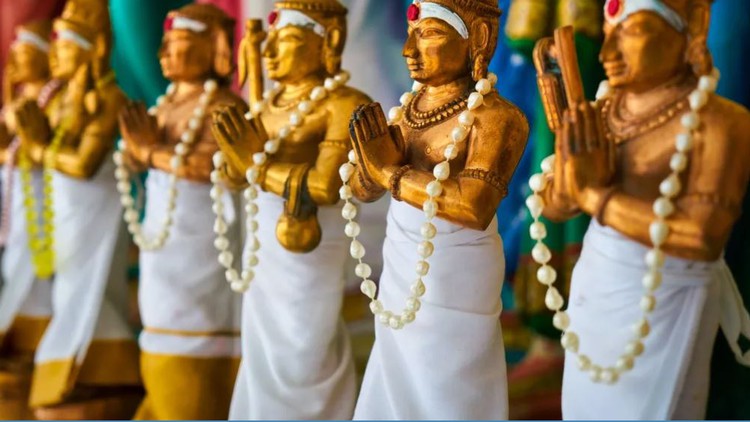
Bhakti Yoga: Connecting to the Divine Within
What you will learn
Understand the philosophy and principles of Bhakti Yoga, including its historical roots and key teachings.
Develop an appreciation for the power and transformative potential of devotion and love towards the divine.
Cultivate a personal practice of Bhakti Yoga, including practices such as kirtan, puja, and seva.
Learn how to integrate Bhakti Yoga principles and practices into daily life, in order to deepen one’s connection with the divine and cultivate inner peace and h
Explore the role of Bhakti Yoga in spiritual and personal growth, and learn how it can help individuals to overcome obstacles and challenges on the path of self
Gain an understanding of the different forms and expressions of Bhakti Yoga, and how they can be adapted to suit the needs and preferences.
Explore the role of community and group practices in Bhakti Yoga, and learn how to participate in and contribute to such practices.
Description
Bhakti Yoga is one of the four main paths of yoga, which focuses on cultivating a loving devotion and surrender to a personal deity or divine force. The word “bhakti” comes from the Sanskrit root “bhaj,” which means to worship or adore.
Bhakti Yoga is based on the belief that the ultimate goal of human life is to realize and experience the divine presence within oneself and in all beings. This is achieved through the practice of devotion, which involves expressing one’s love and devotion to the divine through various means such as chanting, singing devotional songs, performing rituals, and offering prayers and offerings.
In Bhakti Yoga, the personal deity or divine force is seen as the object of love and devotion, and the devotee seeks to establish a deep and intimate relationship with them. The practice of Bhakti Yoga is not limited to any particular religion or tradition, and can be practiced by anyone regardless of their background or beliefs.
The path of Bhakti Yoga is said to lead to the ultimate state of liberation or enlightenment, in which the individual soul merges with the divine. Through the practice of devotion and surrender, the Bhakti Yogi transcends the limitations of the ego and experiences a state of oneness with the divine.
The objectives of a course on Bhakti Yoga may vary depending on the level, duration, and specific focus of the course. However, here are some possible objectives that a course on Bhakti Yoga may aim to achieve:
- To provide an understanding of the philosophy and principles of Bhakti Yoga.
- To introduce and explore the different forms of devotion and practices of Bhakti Yoga.
- To encourage and inspire students to develop a deeper connection and relationship with the divine.
- To help students overcome obstacles and challenges on the path of devotion.
- To provide practical tools and techniques for practicing Bhakti Yoga, such as chanting, singing, and meditation.
- To develop a sense of community and support among students on the path of Bhakti Yoga.
- To deepen students’ understanding and appreciation of the cultural and historical context of Bhakti Yoga.
- To facilitate a transformative and enriching learning experience that integrates the theory and practice of Bhakti Yoga.
- To inspire students to integrate the principles of Bhakti Yoga into their daily lives and relationships.
- To help students recognize and appreciate the diversity of expressions and paths within the broader tradition of Bhakti Yoga.
A course on Bhakti Yoga can be for anyone who is interested in exploring this spiritual path and deepening their connection with the divine through the practice of devotion and love.
Some possible audiences for such a course might include:
- Individuals who are interested in exploring different spiritual practices and seeking to deepen their connection with the divine.
- Yoga practitioners who are interested in exploring the devotional aspect of yoga and integrating Bhakti Yoga practices into their practice.
- Individuals who are interested in Indian spiritual traditions and seeking to deepen their knowledge and understanding of Bhakti Yoga.
- Teachers or practitioners of meditation, mindfulness, or other contemplative practices who are interested in exploring the role of devotion and love in spiritual growth and transformation.
- Anyone who is seeking to cultivate inner peace, happiness, and a deeper sense of purpose in life through the practice of Bhakti Yoga.
Overall, a course on Bhakti Yoga can be for anyone who is open to exploring this path of devotion and love towards the divine and seeking to deepen their understanding and practice of this transformative spiritual practice.
Content